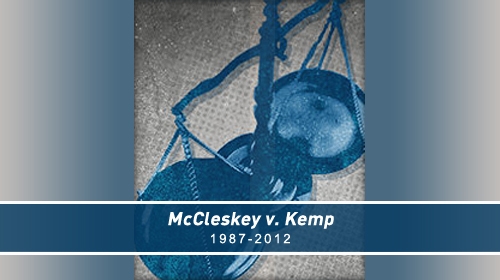
April 22 marks the 25th anniversary of the Supreme Court decision in McCleskey v. Kemp, in which the Court ruled that a defendant cannot rely upon statistical evidence of systemic racial bias to prove his death sentence unconstitutional, no matter how strong that evidence may be. McCleskey has been roundly condemned as a low point in the quest for equality that begs to be revisited. To mark the occasion, every day this week the ACLU Blog of Rights will feature a new post about McCleskey and its legacy. You can read all the posts here, and visit mccleskeyvkemp.com to learn more.
Imagine it's 1976. A high crime rate afflicts German cities, and the government reinstates the death penalty. "We'll have the strongest possible protections for people accused of capital crimes, providing them with free lawyers, right to experts, investigators, appeals to higher courts, and trial by a jury of their peers. This is not the Germany of the Nazi Party. We will never repeat those terrible errors."
Now imagine that 30 years later, statistical evidence shows that Jewish citizens disproportionately get the death penalty; crimes by Jews against Christians are more likely to be selected for a capital prosecution; Jews are routinely excluded from jury service. Further imagine that prosecutors defend all this by saying that Jews shouldn't sit on capital juries because they are mistrustful of German authorities, and that the German high court has ruled that statistical evidence of discrimination against Jews is inadmissible in a death penalty case.
You see where we're headed. My guess is that most people can't get past the second sentence of this thought experiment, let alone past the discrimination against Jews.
Bryan Stevenson, whose idea this is, asks this of America: "Do we deserve to have a death penalty?" If Germany does not — and they emphatically believe they do not — then why do we? Think the parallels are forced? Not accurate? Really?
Consider this: before the Civil War, crimes against Black people in the South were considered only as property crimes against their owners. The Supreme Court issued its Dred Scott decision in 1857, finding that Blacks have "no rights which the white man is bound to respect." Within a few years after the Civil War, the criminal justice system became an engine to produce bodies — Black bodies — to work in the same agricultural fields they had tended as slaves, and in the burgeoning industries of the post-Reconstruction South.
Doug Blackmon's Pulitzer-winning book, Slavery by Another Name, carefully documents the re-enslavement of Black Americans after the Civil War — by a re-tooled criminal justice system that charged, convicted and sentenced freed slaves and their children, grandchildren and great-grandchildren based on the need for free convict labor — not on guilt, innocence, culpability or fair procedures.
Meanwhile, as Black people were being targeted by the criminal justice system for undeserved punishment, the very same system was protecting the vigilante members of white supremacist domestic terrorist groups like the KKK and the Knights of the White Camellia, who were allowed to commit murder, arson and property theft in the open, without fear of arrest or prosecution.
So if a criminal justice system functions to protect white criminals (the Klan) and convict Black workers (for convict labor) with little or no regard for innocence or guilt, what is the one thing that system cannot accommodate? The equal participation in the system of Black people. That means no Black people on juries — by law for many years and by unlawful and unconstitutional discrimination after that. It also means shutting out statistical evidence of discrimination, no matter how explosive, careful and well-documented, that would prove the system — up to and including the sentencing of a person to death — is tainted by race discrimination. That's according to McCleskey, decided by the U.S. Supreme Court 25 years ago.
As a part of a coalition of capital defense attorneys, earlier this year ACLU Capital Punishment Project attorney Cassandra Stubbs participated in the first-ever hearing under North Carolina's Racial Justice Act, which aims to reverse the harm of McCleskey by allowing capital defendants to introduce statistical evidence showing race is a factor in the administration of the death penalty.
The lawyers are challenging the death sentence of Marcus Robinson, a Black defendant convicted for the death of a white person, who was sentenced to death by a jury tainted by a racially biased jury selection process.
Faced with overwhelming proof that Black people are continually excluded from death penalty juries in North Carolina, the prosecutors in Robinson's case argued, essentially, that Black people tend not to trust the criminal justice system, and don't believe in the death penalty as much.
Now back to the thought experiment. Prosecutors in North Carolina argue that Black people, who have been deliberately excluded from and discriminated against by America's criminal justice system since the Civil War, are less likely to trust that system, and therefore it's okay to continue to exclude them from participating in it. Now let's answer Bryan Stevenson's question: Does the United States deserve to have the death penalty?
Learn more about race and the death penalty: Sign up for breaking news alerts, follow us on Twitter, and like us on Facebook.




